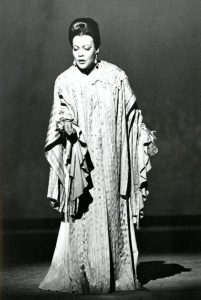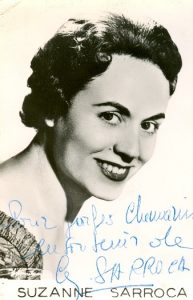Podcast: Play in new window | Download (Duration: 1:42:59 — 105.3MB) | Embed
Subscribe: Spotify | TuneIn | RSS | More
A few months ago I published the first of a series of episodes honoring “Over the Top Sopranos,” which presented French repertoire performed by a batch of supremely distressed divas. And today is a follow-up, again featuring “sopranos en détresse” in which I spread the net even wider, featuring every type of soprano from perky coloratura to hefty dramatic and everything in between. The characters represented range from reformed Alexandrian courtesans to vampiric Hungarian murderers. And the chronological spread is wide, too: we sample a wide variety of singers from Félia Litvinne, recorded in 1902, to Anna Caterina Antonacci, recorded in 2009. In between we hear, among others, Germaine Féraldy, Beverly Sills, Emma Calvé, Lucia Popp, Christiane Eda-Pierre (pictured), Patricia Brooks, Germaine Martinelli, Jacqueline Brumaire, Carol Vaness, Nelly Miricioiu, and Janine Micheau. Works range from the familiar (Mignon by Thomas, Manon by Massenet, and Faust by Gounod) to the obscure (Ivan IV by Bizet, Salammbô by Ernest Reyer, Erzsébet by Charles Chaynes, and Virginie by Alfred Bruneau). Attachez vos ceintures; ce sera encore une soirée extravagante!
Countermelody is a podcast devoted to the glory and the power of the human voice raised in song. Singer and vocal aficionado Daniel Gundlach explores great singers of the past and present focusing in particular on those who are less well-remembered today than they should be. Daniel’s lifetime in music as a professional countertenor, pianist, vocal coach, voice teacher, and author yields an exciting array of anecdotes, impressions, and “inside stories.” At Countermelody’s core is the celebration of great singers of all stripes, their instruments, and the connection they make to the words they sing. By clicking on the following link (https://linktr.ee/CountermelodyPodcast) you can find the dedicated Countermelody website which contains additional content including artist photos and episode setlists. The link will also take you to Countermelody’s Patreon page, where you can pledge your monthly or yearly support at whatever level you can afford.


